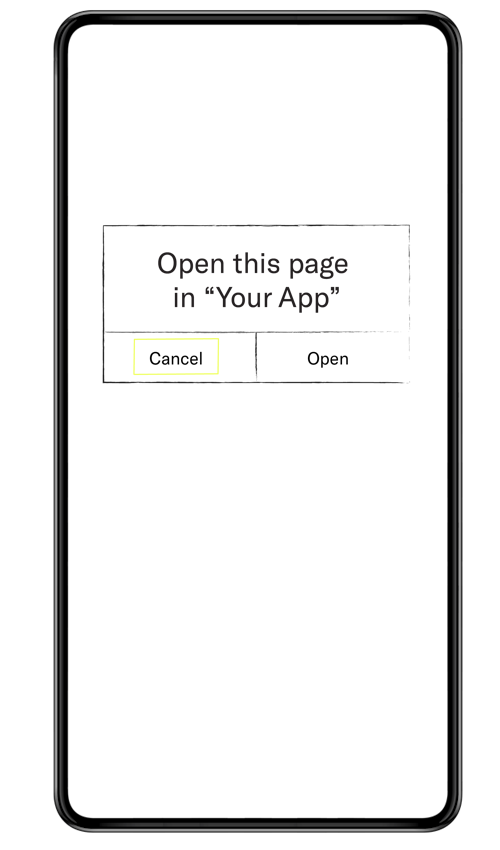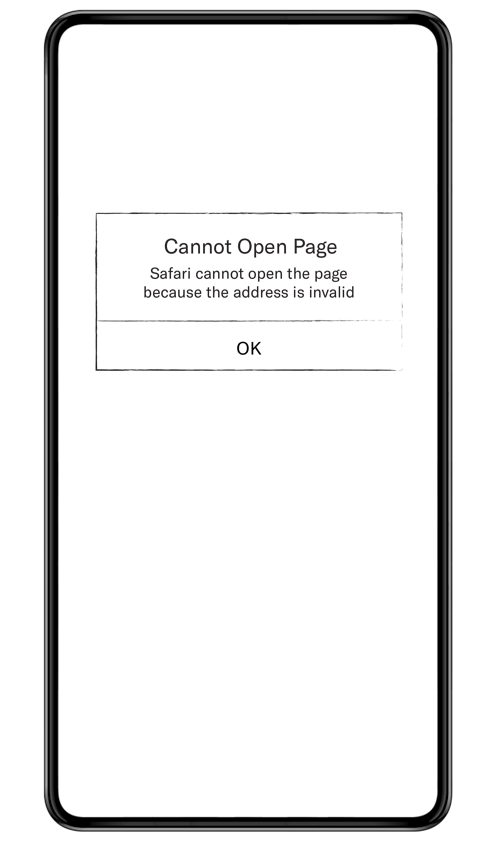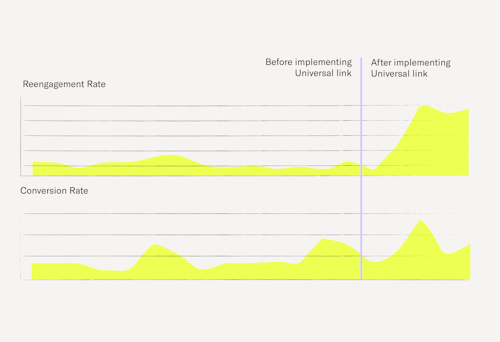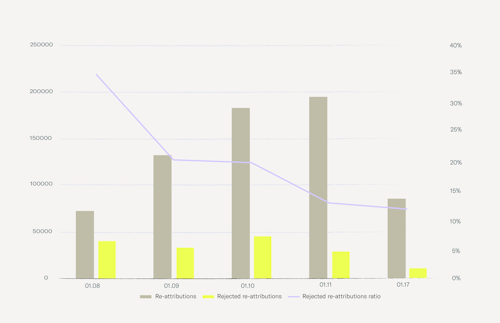5 Reasons Why Universal Links Improve App Performance
March 09, 2020

Deep linking in iOS can be implemented through URL schemes and universal links. While many are familiar with URL schemes, universal links have become Apple’s feature to easily connect app and web with the same link to provide a seamless and guaranteed user experience.
We wanted to provide app marketers some insights on what universal links are and why they are essential in improving performance, especially when it comes to app retargeting.
One link to rule them all
Universal links were first introduced in 2015 along with Apple’s iOS 9 with the aim of improving user experience, and have since become mandatory for proper deep linking into any app.
Since universal links make it easy to connect webpage and app content under one link, they give iOS users an integrated mobile experience and work even when the app isn’t installed.
By supporting universal links, iOS users can tap the link and be seamlessly redirected to the installed app without going through a web browser. If the app isn’t installed, the mobile website is launched on the smartphone instead. Because universal links seamlessly lead users directly to an app, this method is proven to increase app engagement.
So why doesn't everyone have them in place?
Here’s the thing: universal links only work if the user clicks a URL that matches the redirect URL’s domain. In other words, universal links don’t work when redirects come from a different domain.
This means that app developers need to define exactly which domains are allowed to open their app otherwise users will be redirected to the mobile web, consequently giving iOS users an additional layer of security. With universal Links, mobile measurement partners that redirect users to the app or mobile web need to be whitelisted within the app, providing the app developer with better control of their user’s experience and privacy.
Nevertheless, here are five good reasons why taking the time to implement universal links improves performance in the long run:
1. Universal links can fallback to the app store when the app open breaks
Mobile measurement partners provide technical solutions to support a redirect to the App Store instead of the mobile website, therefore making the requirements of having a mobile website obsolete for mobile-first advertisers.
In the event that an app-open trigger fails to launch, universal links redirect users to the app store to prompt an app install - a big plus for mobile-first advertisers who want users to re-engage in their app. The user flow for universal links was a significant improvement from URL schemes and deep links where the user would have arrived at a dead-end when the URL scheme failed to respond. While a fallback was also possible for URL schemes in the past, Apple has since removed that feature.
2. Universal links are necessary for re-engaging users
When bringing a user back to update the app and to re-engage with the app, universal links are necessary for performance. While deep links work similarly in terms of bringing the users back from an ad into your app, performance will generally be poorer since deep links prompt a message that pops up on the user’s screen. This creates an additional dialogue where the user has control of when they can opt-out.

Not to forget: At any given point in time, Apple might depreciate the support of URL schemes completely for iOS and apps without universal links will have to bear the cost of lost conversion opportunities.
3. URL schemes are constrained by the app install

While URL schemes take the user to a specific destination within the app, both methods are only effective if the user has the app installed on their device. Without the app, redirects either trigger an error message or worse - nothing, therefore breaking the user flow.
Without universal links, an app open can fail if the user doesn’t have the app, or has an outdated version of the app on their mobile device, therefore creating a poor user experience.
4. Universal links improve retention and conversion rates
So how can universal links improve performance? The answer is quite simple: universal links take users right where they want to be. The sooner they get to the content they want to see within an app, the more likely for them to convert. Removing any additional steps in the purchase flow will give the user a better experience while positively impacting app revenue.

Re-engagement rate and conversion rate after implementing universal links, received from a client via Adjust
As seen above, the re-engagement rate shows the number of successful sessions after a click i.e. app opens while the conversion rate shows the number of desired conversion events i.e. purchase event.
Real-time post-back data shared by an unnamed client shows that after implementing ULs, there was a significant increase in the re-engagement rate which later led to a higher conversion rate.
Advertisers see significant gains on app usage and app revenue immediately after implementing universal links, because a properly implemented universal link doesn’t provide any possibility for a user who clicks on a link to opt-out of the app-open flow. There are no pop-up dialogues asking for confirmation nor redirects into the AppStore, but users are instead seamlessly led into the app. Good user experience results in an immediate session event that is tracked as an app-open event afterward.
5. Re-attributions are more accurate and rejected re-attributions go down
A reattribution is a legitimate association between a click and an app open, which means that moving forward, all in-app events that happen after the click will be associated to the advertising partner that delivered the last click. In case an app open is triggered outside a given average time-frame, mobile measurement partners might reject the reattribution and still consider the follow up in-app activities as organic.
Click fraud is another dominant topic in the advertising domain. Mobile measurement partners utilize fraud detection mechanics to identify whether an app open can be associated with a click from an advertisement partner.

Reattributions and rejected reattributions: app-open success rate, received from a client via Adjust
A smooth flow for users to open the app shows that over time, the number of re-attributions increase and rejections go down, leading to shorter click-to-app open times — a key indicator of fraudulent behavior (thus resulting in lower rejected re-attributions ratio). Each click becomes a properly attributed session for the client, which ultimately improves performance.
Wrapping up and key takeaways:
- Having universal links in place benefit users no matter which segment they are in your retargeting plan.
- Implementing universal links pays off with higher re-engagement and conversion rates
- Based on re-attributions and rejected re-attributions, universal links assist in detecting fraudulent behavior
This blog post is part of a series of tips and tricks on how to spend your retargeting budget effectively, brought to you by Remerge and adjust.





